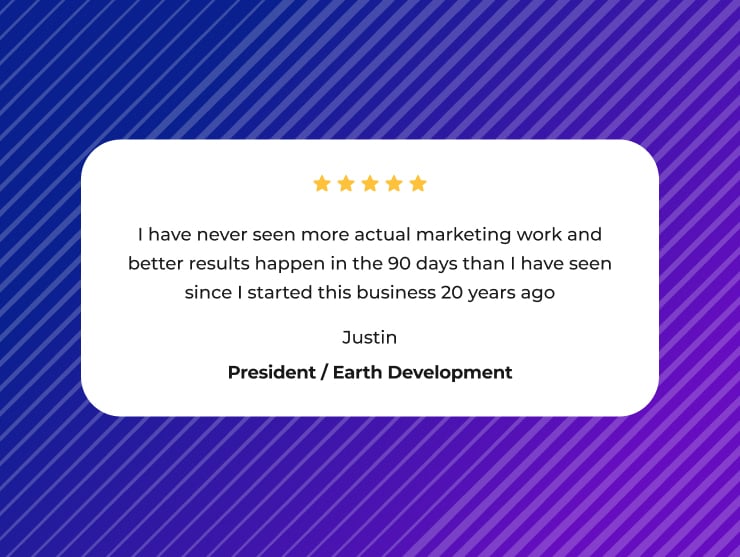If your schedule is light, it’s not your work. It’s your visibility.
In 2025, over 46% of all Google searches are for local services like yours. And with nearly 20% of the landscaping industry made up of new businesses each year, the competition is only getting tougher.
The good news? The right digital strategy can bring you more local clients!
Just look at Absolute Home Services, a landscaping contractor in the Greater Toronto Area. They were getting overshadowed by bigger competitors — until we revamped their digital strategy. With the right website and marketing in place, they generated 922% more qualified leads and achieved a 4,363% return on investment.
In this guide, you’ll discover 14 proven landscaping marketing strategies to help you:
- Rank higher in Google’s local results
- Turn your website into a lead-generation engine
- Get more 5-star reviews
- Stay booked — even when your competitors slow down
Let’s get into it.

How to Promote Your Landscaping Business In a Crowded Market
If you’re not actively promoting your business, you’re losing visibility — and clients — to hungrier, more strategic competitors.
So, how do you stand out?
It starts with a clear marketing plan that targets the right audience and uses the right channels to reach them.
Most landscapers still lean on traditional tactics like yard signs or referrals. While those can help, they’re no match for a modern digital marketing strategy — especially when 93% of buying journeys start online.
Here’s what works:
- Search Engine Optimization (SEO): A long-term strategy that helps you rank on Google when people search for services like “landscaper near me.”
- Pay-Per-Click Advertising (PPC): A faster, budget-controlled way to appear at the top of search results and drive instant traffic.
- Google Business Profile, local service ads, and email marketing: These tools make sure you’re showing up in your neighborhood, where your next job is waiting.
If your current marketing feels more like guesswork than strategy, you’re not alone. But you don’t have to do it alone either.
Comrade Digital Marketing Agency is happy to help you attract homeowners ready to hire. Schedule a free consultation today.
When Should You Start Landscape Marketing?
Marketing isn’t a one-time task, and the best time to start is sooner rather than later. To get real results, you’ll need a few basics in place first.
That means an SEO-friendly website, active social media profiles, and a clear strategy.
You’re ready to market when:
- You know your target audience
- You have a way to collect leads or sales
- You can position yourself against competitors
- You’ve set aside a budget
- You have a plan to reach local customers
A solid plan upfront means fewer missteps (and faster results) once you go live.
Wondering if you should hire an SEO agency?
If you’re ready to grow but don’t have the time, tools, or in-house know-how to improve your local rankings, it’s probably best to hire an SEO agency for landscapers.
An experienced team brings proven strategies, deeper insights, and faster execution, so you’re not wasting months on trial and error.
The Blueprint to Becoming the #1 Landscaping Company in Town
If you want to rise above the noise (and the dozens of competitors in your area), you need a strategy that makes people remember your business.
That starts with two things: a clear brand and a value proposition that actually means something to your customers. Once you’ve got that locked in, here’s how to stand out where it matters:
| Be visible where your prospects are | If your website isn’t showing up on Google, and your social media is a ghost town, no one’s finding you. Build a presence where people are already searching and scrolling. |
| Look better than your competition | What do your competitors do well — and how can you do it better? Clean branding, pro-quality photos, and fast-loading pages make a big first impression. |
| Capture your target audience’s attention | It’s not just about getting clicks — it’s about getting customers. Use strong calls to action, SEO, and PPC to turn casual interest into booked jobs. |
| Show them you get it | Speak to your customers’ problems before they even tell you. Whether it’s “I’m too busy to mow” or “This yard needs serious help,” anticipate their needs and exceed expectations. |
| Win more local clients | Dominate your backyard before you try to own the whole city. Google Business Profile, local PPC ads, and hyper-targeted email campaigns put you in front of the right people at the right time. |
14 Landscaping Marketing Strategies to Drive Revenue
Have you ever searched for a local business on Google before calling?
Your customers do the same thing! If your landscaping company isn’t showing up, that call will go straight to a competitor.
This is why it’s crucial to target local clients with smart strategies like SEO, PPC ads, and email campaigns to get seen by the right people when they’re ready to book.
Not only that, your site needs to be fast, mobile-friendly, and packed with content that answers real questions, using the exact keywords your ideal clients are typing into Google.
1. Establish Your Landscaping Company Brand
You have a landscaping business, but do you have a brand? Most conceive branding as deciding upon a logo and ensuring the company’s visual identity is consistent on their landscaping vans, yet it is much more strategic than this.
Branding is the process of creating a strong, positive perception of a company, including its products and services in customers’ minds by combining elements such as a logo, design, mission statement, and consistent theme throughout its marketing communications. It is also crucial to create a brand that appeals to local customers, as this can significantly enhance your connection with the community and drive more business.
AI Tip: Use AI tools like ChatGPT or Copy.ai to brainstorm your brand voice, slogan, and elevator pitch, tailored to your ideal customer.
The Importance of Branding for Your Lawn Care Marketing Strategy
Why do you need branding? Well, if all landscaping businesses offer similar services at more or less the same price, then they won’t be able to differentiate themselves from competitors or build a loyal customer base. Branding gives clients a reason to choose your products.
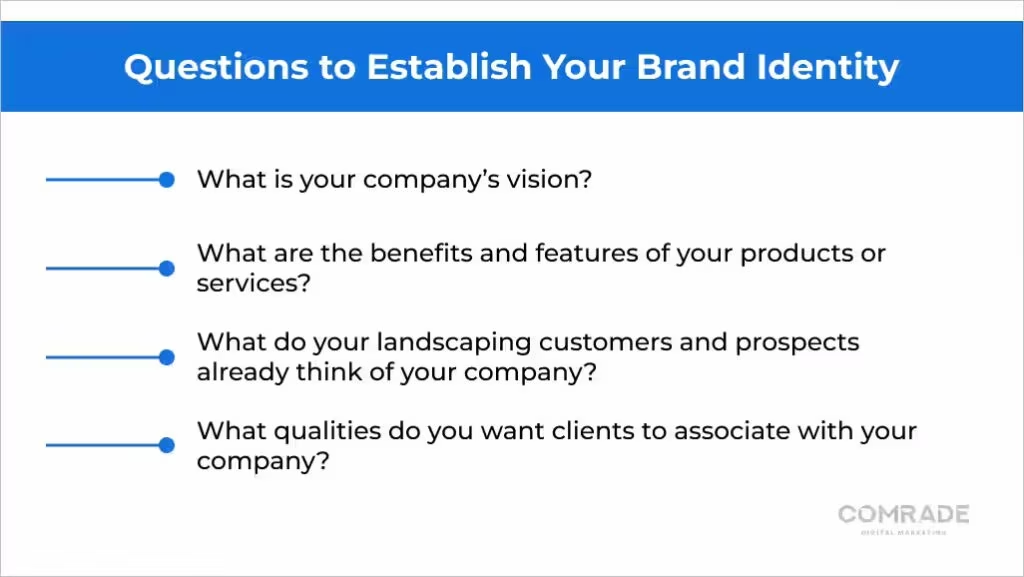
Take McDonald’s and Burger King, or Nike and Adidas. What makes consumers prefer one brand over another? Branding!
A well-defined brand can immediately answer the questions below:
- What is your company’s vision?
- What are the benefits and features of your products or services?
- What do your landscaping customers and prospects already think of your company?
- What qualities do you want clients to associate with your company?
Once you’ve established the unique selling points of your landscaping business, you can develop tangible assets incorporating and communicating your brand, which includes:
- Developing brand standards and a visual identity that accurately reflects your landscaping business.
- Designing templates for marketing materials from your website to your logo and email signatures.
- Creating a “voice” for your company that reflects your brand. For instance, will you communicate in a formal or friendly manner?
Your brand will only work if you integrate it throughout your business and digital marketing strategy. Just like other aspects of internet marketing for contractors, you should set up branding key performance indicators and track performance, so you know where to improve brand performance.
2. Market Your Landscaping Services Before the Season Starts
Your marketing campaign should begin well in advance of this time. With a landscaping marketing plan, timing is everything; however, it’s often overlooked by businesses, especially those with small teams and budgets.
Many owners think they have to market with the same gumption throughout the year, yet deciding on specific times to push their efforts can lead to better ROI. When you appeal to your audience around the time they need your services, they are more likely to engage, increasing engagement, leads, and sales.
A perfect and somewhat clichéd example is the importance of Christmas marketing. This doesn’t imply companies don’t market throughout the year, but rather that they strategically time their efforts with the seasons, trends, and notable calendar events.
As part of your lawn care marketing strategy, you should develop marketing timelines to plan, monitor, and execute campaigns. Planning campaigns to target local customers before the season starts can significantly boost your reach and effectiveness. Having an overview helps you see what needs to get done, as well as organize and delegate tasks.
Some marketing strategies for landscaping businesses take longer to perform than others. For example, preparing a social media campaign compared to writing blog posts.
When you have a clear timeline, it’s easier to allocate adequate time to the components of each campaign, preventing roll-out bottlenecks.
AI Tip: Use AI tools like Jasper or Notion AI to build a seasonal content calendar with campaign ideas based on customer pain points and search trends.
3. Facilitate Reviews from Customers

Among digital marketing experts, it’s common knowledge that 90% of consumers read online reviews before buying products or hiring services.

Additionally, 88% of consumers trust online reviews as much as referrals from friends, family, and co-workers. When reviews positively reflect the quality of your landscaping services, they build credibility and trust. Reviews are gatekeepers to your business’s reputation and essentially free advertising. More importantly, they also factor into local search rankings. Positive reviews from local customers can significantly boost your local SEO. The more positive reviews and ratings you have on Google, the higher your business will rank online. A 0.1% increase in star ratings can boost conversion by up to 25%. Further evidence suggests that 72% of people asked to leave a review will do so.
Clients are less likely to leave a review if it’s a hassle, so you need to make the process as easy as possible by:
- Including multiple options, so your clients can choose which platform they’re most comfortable with.
- Including a link directly to the page whether they can leave a review, minimizing the number of clicks they have to take, and the reducing risk of not finding where to leave their review.
- Provide a prompt for them to start without thinking too much, for example, “What did you like about our service?”
AI Tip: Use AI-powered review automation tools like Birdeye or Podium to send smart reminders and craft thank-you replies based on tone and sentiment.
Landscaping email marketing is a game-changer for growing your client base. Read our article for actionable advice!
4. Lawn Care Marketing Tactics to Optimize Your Website
Landscaping website optimization is the process of using tools and strategies to improve the performance of your website and achieve your business goals. It’s estimated Google handles 1.2 trillion searches on a yearly basis. The reality is, it doesn’t matter how great your website looks. If you don’t optimize it, it will effectively be lost among 50 billion web pages.
Optimizing your website for local customers is crucial to connect with residential and commercial clients in your area.
SEO for Landscaping Business
Search engine optimization (SEO) is the process of getting your web pages to rank higher in search engines like Bing and Google. Because search is the main way people discover content online, it’s important your landscaping business ranks high. Additionally, focusing on local SEO is crucial to target local customers effectively.
Website traffic (users that click on your website) comes in two ways: either from paid ads at the top of the page or by regular search results known as “organic search traffic”. When your content contains words and phrases (keywords) that users search for online, Google is more likely to rank those pages and present them to users. Of course, this is a rudimentary explanation of a very complex, algorithmic process, but in a nutshell: If you’re not using keywords, then you probably won’t rank at all. This has nothing to do with the actual quality of your website or content. It’s just that the web is highly competitive, and search engines strive to provide users with the most accurate information possible.
As one of the most effective lawn care marketing tactics, keyword research can help you identify which terms qualified leads are using online, and provide direction on what content marketing material to create, or where you can update your existing web pages.
Tip: Using tools like Google Search Console and Google Ads Keyword Planner can help improve search engine rankings and fix technical SEO issues.
Need help with SEO for landscapers? Our article offers step-by-step guidance to boost your ranking and visibility!
Lead Conversion Optimization
Lead conversion optimization nurtures and converts prospective clients who visit your website into loyal paying customers**. The easiest way to do this is to make sure your company website is full of calls-to-action, or buttons, links, and forms that encourage further action. So, when designing your website, think about what you want your visitors to do on each page.
Should they sign up for a newsletter, contact you, buy products, or schedule a service? Each web page should prompt potential clients to act, even if it’s to click through to another page. eCommerce website design is always developed in such a way to lead potential clients further down the marketing funnel. Optimized calls-to-action are crucial for converting local customers, ensuring they engage with your services effectively.
An important factor to pay attention to is the number of clicks it takes for visitors to purchase a product or book a service. The smaller the number, the less friction the user experiences, and the more likely they are to check out. Every click should take users closer to their goal.
When it comes to calls-to-action, make sure they are clear in what they ask for and what the user will get in return for completing the action. This calls for a careful lawn care marketing strategy. You won’t have much luck, for example, if you ask potential customers to call a sales rep on a page that is designed to display blog posts.
Landscape Website Design
Potential clients should always know exactly where they are on your website and have easy access to where they would like to be. From the color-scheme to mobile-friendly designs and SEO-tailored UX, there is a lot that goes into even the simplest website designs, which is why businesses tend to hire website development professionals for their digital marketing services. Landscaping companies, like all businesses, benefit from their design expertise.
The goals of your landscaping business will dictate your website’s hierarchy and navigation layout. When developing the design, you should consider the following:
- How will you direct visitors through your funnel?
- What information is most valuable for your visitors?
- What is the goal of visiting your website? Can potential customers easily achieve it with your website design?
It is also crucial to design your website to appeal to local customers, ensuring it meets their specific needs and preferences.
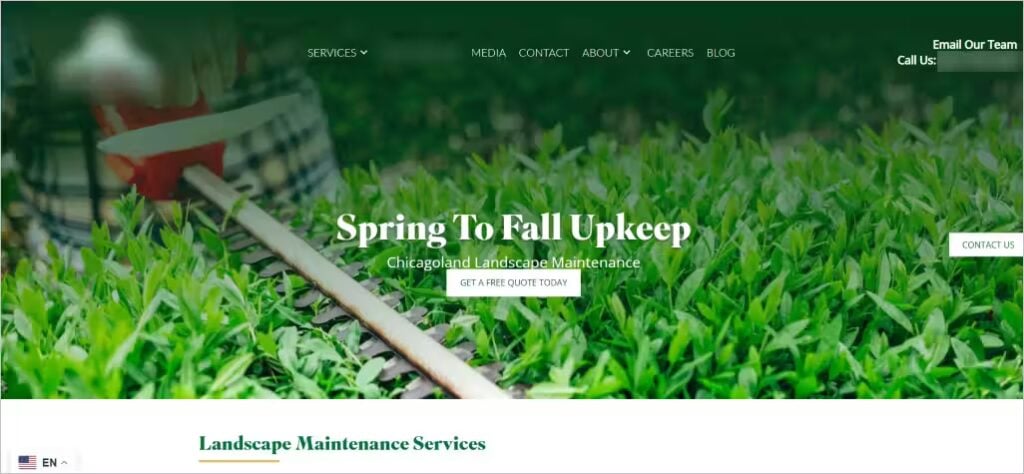
Additionally, you’ll also need to adhere to mobile navigation best practices and standards. Over 90% of the global internet population uses their mobile device to go online. In all probability, your potential customers will likely search for something similar to “landscape business near me” or “lawn care business near me” on their mobile.
Now, imagine if your website looked terrible on a mobile phone. You would lose out on a sizeable share of the local market. Google recommends using only responsive web design templates because you only need to maintain one version of your website instead of two.
Generate New Content for Better SEO Results
According to leading inbound software company HubSpot, content marketing is important because “it answers your audience’s questions and helps you build trust, develop relationships, improve conversions, and generate leads.”
Overall, 80% of consumers prefer to get company and product information in a series of articles rather than an advertisement, underscoring the importance of developing content for your landscaping digital marketing strategy. Instead of pitching your products and services, content marketing captures your target audience’s attention by providing valuable information that helps them address informational and task-oriented needs. The idea is that over time, potential customers will come to trust and rely on your guidance, recognize your landscaping business’s unique value proposition, and become loyal customers. Creating content that appeals to local customers can further enhance your connection with the community and drive more targeted traffic. Through SEO-friendly blogging, video creation, and newsletter sharing, to name a few, you can:
- Create brand awareness
- Build audience engagement
- Improve lead generation
- Drive loyalty
- Boost sales
Google also likes fresh content. When there are frequent visitors to your site (due to interest in new content), it signals to the search engine that the website is active and in use, and therefore relevant, leading to a higher search engine ranking.
5. Boost AI Visibility with Generative Engine Optimization (GEO)
It’s not just about ranking on Google anymore. You need to show up in AI-generated answers, too.
Tools like ChatGPT, Gemini, and Google’s AI Overview are changing how people find service providers — and if your landscaping company isn’t part of these answers, you’re missing out on qualified leads.
255 million people use generative AI tools globally, and 65% of users say they trust AI-generated answers for local service recommendations.
Generative Engine Optimization (GEO) is the next evolution of SEO. It’s how your business gets recognized, cited, and recommended by AI systems. That means showing up when a homeowner types, “Who’s the best landscaper near me?” into an AI chatbot, voice assistant, or on Google’s AI Overviews.
Here’s what effective GEO looks like:
- Structuring your site content around natural, conversational queries.
- Adding schema markup to help AI tools understand your services, location, and expertise.
- Building topical authority with expert content clusters.
- Optimizing for brand mentions and citations on trusted online sources.
AI Tip: Ask ChatGPT to simulate how AI tools describe your business — then adjust your site content, schema, and citations to match and improve visibility.
6. Use ROI-Effective Landscape Marketing Channels
Search, paid, and email marketing have the highest ROI. For every $1 spent on email, you can expect an average return of $36. Most people check their emails every day; therefore, it is more likely to drive sales than social media channels, which may be checked less frequently.
A well-written email with a clear call to action is far more likely to move potential customers closer to conversion. SEO, still being among the most effective long-term digital marketing strategy development services, takes at least six months to a year to produce results, and social media requires frequent upkeep. Additionally, using marketing channels that target local customers, such as PPC campaigns and Google Business listings, can significantly enhance your reach within the community.
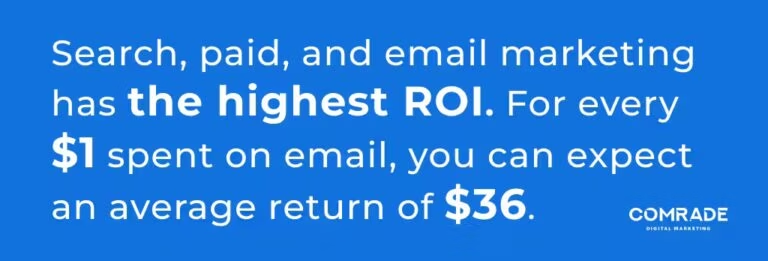
Landscape email marketing, however, allows you to reach high-quality leads who have already shown an interest in your services, without inundating them with relentless advertisements. Direct mail works in the same way, although we’d recommend email over a direct mail campaign because you can track email open rates, click-through rates, and conversions more accurately. It’s far more challenging to track the effectiveness of mail sent via the post.
If a prospective client has completed a lead capture form, your company can use this to send further content marketing material reminding them of your services and offering discounts to encourage them to make a purchase.
AI Tip: Leverage AI-powered platforms like Mailchimp or HubSpot to create email sequences that segment, score, and nurture your best leads automatically.
7. Don’t Forget about Offline Lawn Care Marketing Tactics
While we know that across all devices, the average U.S. citizen spends six hours and 58 minutes online per day, there is still room for more traditional marketing methods, especially for organizations with high neighborhood visibility, like landscaping services. Targeting local customers through offline marketing tactics can significantly enhance your reach and engagement within the community.
Hand Out Flyers
Since landscaping marketing is very much local, handing out flyers is still a highly effective form of advertising. Handing out flyers is an excellent way to target local customers directly. A simple leaflet left underneath windshield wipers or in the post box will get your name out there and generate awareness in new and familiar areas. You could even provide a discount for first-time clients.
Branded Clothing, Vehicles, and Merchandise
Remember, part of your lawn care marketing strategy is ensuring your landscaping business is easily recognizable. Making staff wear branded clothing, even if it’s just a t-shirt with your logo, and investing in vinyl wrapping your company’s logo and contact details on your car are also great offline marketing tactics. Increasing visibility among local customers through branded clothing and vehicles can significantly boost your reach in the community.
Just by driving around, you can get between 30,000 to 70,000 daily impressions. Meaning, that many people will conveniently see what you have to offer, without you going out of your way to spread brand awareness in your service area.
Start a Lawn Care Loyalty Program
A landscaping company thrives on seasonality, yet it needs regular customers to ensure success. Encouraging new and current clients to sign up for long-term contracts brings stable cash flow. Targeting local customers for long-term contracts through a loyalty program can significantly enhance customer retention. Launching a loyalty program boosts profits and cushions the blow during low seasons.
For instance, you could encourage current customers to sign up for ten services and give them the eleventh one for free. Loyalty programs make customers feel like they can save money with your business, and they are lucrative if you have a large volume of small residential clients or big-ticket commercial clients.
8. Create an Ideal Customer for Your Landscaping Business
Have you mapped out your ideal client and built out a customer profile/persona? If you’ve been around marketing speak, you’ve likely heard these terms countless times before. If you haven’t, you’re probably wondering why they’re important.
Small businesses that don’t define their customers risk marketing to nondescript audiences, which can waste time, resources, and money. Now, you might be thinking, “my customers are anyone who has a backyard”, which may be true, but if that is the case, you can still refine your lawn care marketing tactics.
The digital age affords marketers the privilege of targeting precise groups of customers, or what we call audience segments. For example, you can advertise to people according to their interests, age, location, and online preferences.
So, within your target audience of “anyone who has a backyard,” there might be single mothers, families, and government bodies with civic buildings that need a lawn care company. To refine your target audience and its subsequent segments, you should answer the following questions:
- Who are they? You’ll need to know basic demographics like age, profession, location, etc. Defining local customers as part of your target audience is crucial for effective marketing.
- What are the top problems that your lawn care business can solve? Is it regular lawn mowing and/or seasonal pruning and flowerbed maintenance?
- What content do they consume? Knowing what content your audience likes and which social networks they use helps produce lawn care marketing that appeals to their preferred subjects.
- Who makes purchasing decisions? This affects messaging and who you target with your advertising. For example, if you’re targeting a commercial business, the person making the decision may be the property manager, whereas if you’re targeting residential homes, it will be whoever the breadwinner is.
Of course, there are many more questions to ask, but you get the idea!
AI Tip: Use ChatGPT or HubSpot’s AI persona builder to generate detailed customer profiles based on location, behavior, and service needs.
9. Develop a Referral Strategy
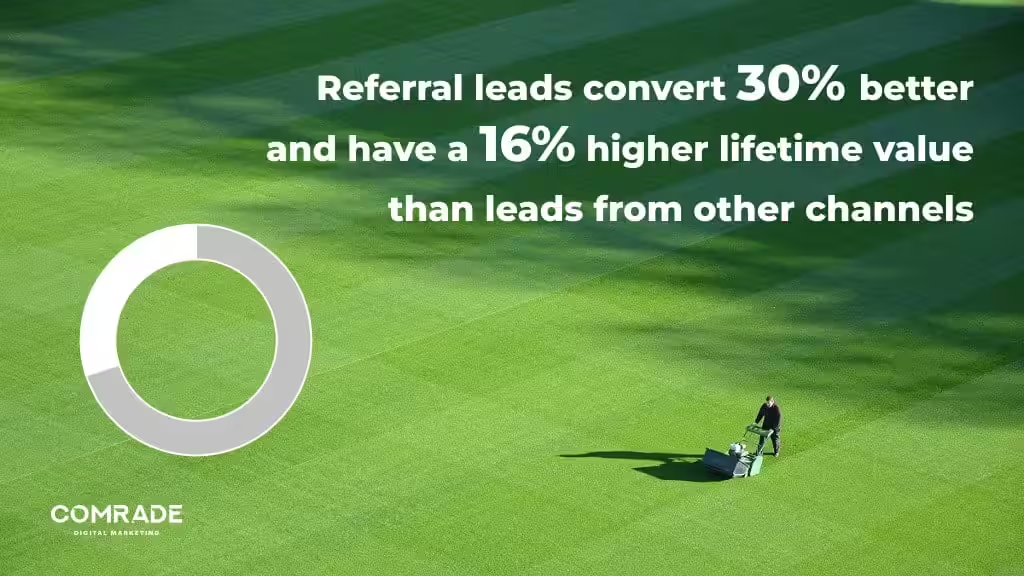
This is a rewards-based strategy that’s initiated and directed by marketers to encourage word of mouth and customers’ personal recommendations to grow a landscaping business’s customer base. Referral leads convert 30% better and have a 16% higher lifetime value than leads from other channels.
Developing a referral program will help you target a more precise audience, who in turn recommend your services to others who will benefit too.
As a result, you’ll acquire high-quality customers without spending a ton on advertising. These types of programs also help build and nurture long-term relationships with customers. If your landscaping business provides a good service at a reasonable price, there’s no reason why customers won’t hire you season after season.
Encouraging local customers to refer others can significantly boost your reach within the community.
Besides, when it comes to marketing strategies for landscaping businesses, it generally costs more to find and engage with new customers than to retain existing ones. Referred customers have an 18% lower churn rate than customers acquired by other means. Furthermore, businesses with rewards-based programs can expect 81% more engagement from their customer base.
AI Tips: Use AI tools to analyze which customers are most likely to refer others, then automate personalized referral invites through platforms like ActiveCampaign.
10. Create Accounts on Relevant listings
Local SEO is a critical part of landscaping digital marketing that maintains and promotes your business’s online presence. Without consistent and accurate information, it’s impossible for new customers and search engines to find, verify, and promote your company.
Any business that has a physical location or serves a geographical area benefits from local SEO. Google figured out that people frequently searched for businesses in their immediate area and adapted its algorithm to proximity factors.
If you’ve ever searched Google and a map with 3 listings appears (called a map pack), then you’ve seen local SEO at work. To reap the benefits of local SEO, you need to open a free Google Business account, so Google can verify your business. Be sure to fill out all contact information accurately, and encourage customers to share reviews online. Creating accounts on relevant listings helps target local customers effectively.
The more positive reviews you have from satisfied customers, the higher you’ll rank for local SEO listings. Landscape companies in the United States also benefit from listings on Express Update, Neustar Localeze, Yelp, Facebook, Apple Maps, and others.
AI Tip: Use BrightLocal or Yext’s AI tools to audit and update all your local listings at once, and stay consistent across every platform.
11. Dive Into Social Media
While social media doesn’t necessarily drive more leads, it provides ample opportunity to create brand awareness and connect with current and new audiences. It’s about meeting your target audience where they are and socially interacting with them.
You don’t have to be on every platform to be successful, but to be effective with your landscaping digital marketing, you will have to conduct some research to understand how your specific audience spends their time online. Using social media to connect with local customers can significantly enhance your reach and engagement within your community. It’s also perfectly fine to use different channels to pursue different business goals and reach various audience segments.
The average social media user has 8.4 social media accounts, so selecting 2-3 platforms is a good starting point. Once you know which ones best suit your landscaping services, you’ll need to draw up separate marketing strategies and content marketing plans.
AI Tip: Use AI scheduling tools like Lately or Hootsuite’s AI writer to repurpose blog content into daily social posts that stay on brand and on time.

Looking to scale or increase your revenue? Marketing is a proven way to grow your landscape business
Book a Free Consultation12. Start a Landscape PPC Marketing Campaign
Pay-per-click or PPC is a form of advertising where you pay a small fee each time someone clicks on one of your ads. PPC ads appear in carousels at the top of search results on mobile and desktop, and in the right column on desktops in blocks called “knowledge cards”.
With this type of paid advertising, you have complete control over your budget, targeting, and ad placements. With some experimentation (A/B testing), you can find the perfect balance between your budget and positive results. Targeting local customers through PPC campaigns can significantly enhance your reach and effectiveness, especially for a landscaping business.
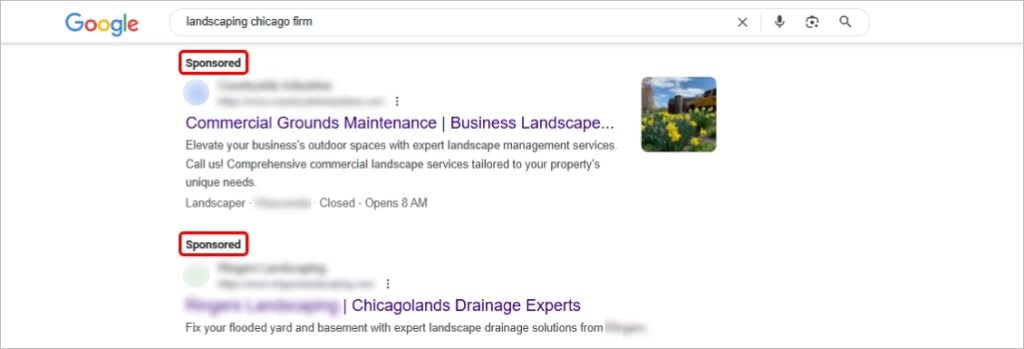
While content marketing and SEO can take time, landscape PPC marketing creates a middle-ground between nurturing potential new clients and serving the middle of the marketing funnel by providing downloadable resources, seeking email subscription signups, and hard-selling services.
Visitors from targeted PPC ads are 50% more likely to make a purchase than those derived from organic traffic. When you refine your research and use the correct keywords, you won’t only get high-quality leads, but you’ll also climb in organic search engine results.
AI Tip: Use Google Ads’ AI-powered Performance Max campaigns to automate targeting, bidding, and creative testing for the best local results.
Need guidance on PPC for landscapers? Our article explains how to maximize your PPC campaigns to drive more business!
13. Improve Your Sales Method
People don’t buy products or services, they buy the results of each. So, when you’re selling, you want to focus on the benefits you provide to your landscaping customers. Perhaps it’s spending more time with the family, or simply the convenience of never having to worry about mowing the lawn. Either way, make sure your landscaping digital marketing campaigns appeal emotionally to your audience.
If you’re a large landscaping business, you might consider using a customer relationship management (CRM) platform to track the sales process. CRMs streamline communications and centralize customer data, giving you a better picture of business performance. In some instances, conversion rates have skyrocketed as much as 300%. Additionally, tailoring your sales methods to local customers can significantly enhance your reach and effectiveness.
CRM advantages include:
- Improved customer satisfaction
- Increased revenue
- Decreased costs
- Marketing optimization
- Increased departmental collaboration
- Accurate data and insights
AI Tip: Use AI-driven CRMs like Zoho or Pipedrive to track leads, automate follow-ups, and score prospects based on likelihood to convert.
Want to boost your business with landscaping SEO companies? Check out our article to discover how they can help you rank higher!
14. Hire a Landscaping Marketing Company
You wouldn’t expect your clients to design and maintain their own lawns, so why try to DIY your marketing?
Like landscaping, digital marketing requires specialized skills, tools, and strategy. And when you work with the right agency, you don’t just save time — you get real results faster, without the trial and error.
A professional landscaping marketing company can help you:
- Target the right local clients (residential and commercial)
- Generate more qualified leads
- Maximize your ROI on SEO, PPC, and web design
- Stay ahead with the latest tools and trends
- Get expert insights and an outside perspective
Most landscaping businesses are already juggling a million things, and marketing often gets reduced to “just get something out.” That mindset wastes money.
Hiring a marketing partner means you’re no longer guessing. You’re focused on growth, with a team that knows how to get your phone ringing — and keep it that way.
AI Tip: Partner with agencies that use AI for reporting, content optimization, and lead tracking, so you get smarter insights and faster ROI.

You Handle Business. We’ll Bring In Business.
Let’s be real — hoping someone finds your landscaping website or remembers your name next season isn’t a marketing plan. It’s a risk!
And in 2025, with competitors popping up left and right, gambling on your growth just won’t cut it.
The good news? You don’t need to become a marketing expert to stay fully booked. You just need the right team!
At Comrade Digital Marketing, we leverage powerful SEO, PPC, and data-backed strategies to help landscaping businesses like Absolute Home Services (and yours!) achieve high-impact results like:
- 4,363% marketing ROI
- 922% more qualified leads
- 5,000% growth in organic traffic
Book your free strategy session today and let’s get your phone ringing with real high-paying clients!
